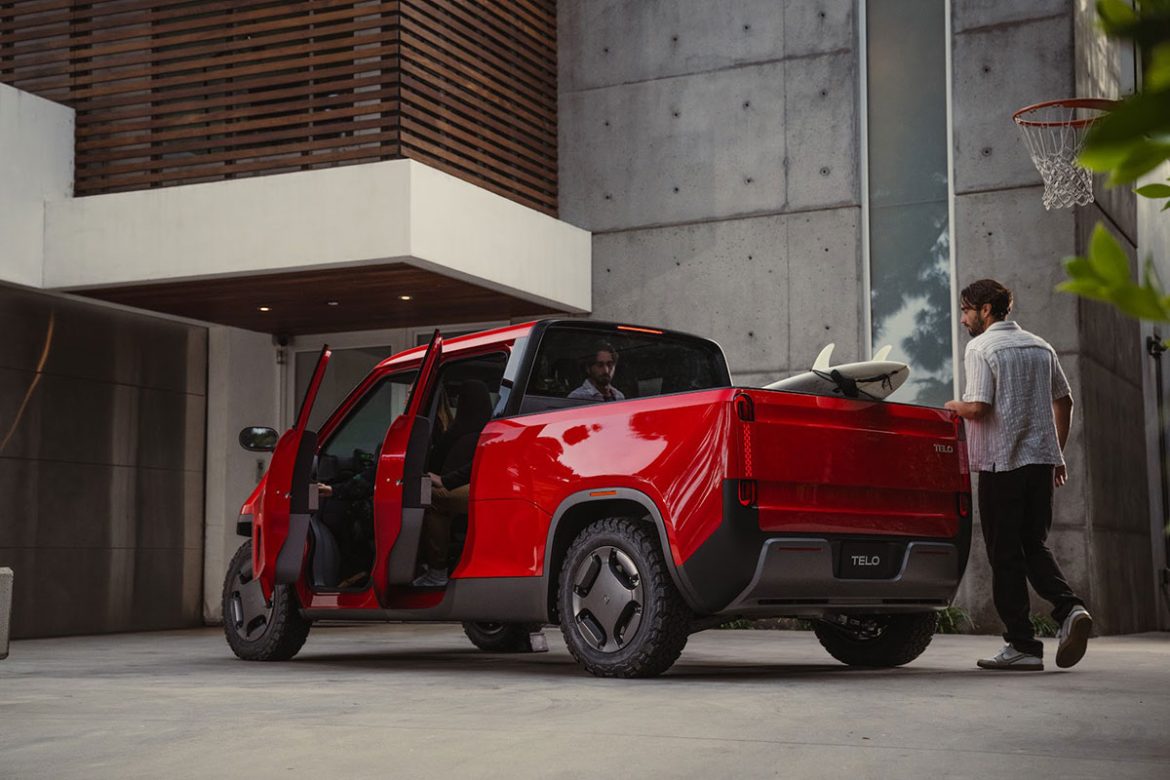Big electric trucks are having a hard time. The Cybertruck is a bust, Stellantis just canceled the Ram 1500 REV, and even sales of Ford’s promising F-150 Lightning have been on the decline.
But the United States loves trucks. So is the key to making them love electric trucks… a very small one?
That’s the bet that California-based startup Telo has been making since its inception in 2022. The company has designed a bite-sized truck called the MT1 with an admittedly not-so-small starting price of around $41,000.
Now, investors want in on that same bet: Telo announced Tuesday it has closed a $20 million Series A funding round. The round was co-led by designer and Telo co-founder Yves Béhar, and Tesla co-founder Marc Tarpenning, who is on Telo’s board. Additional investment came from Salesforce CEO Marc Benioff, and early-stage funds like TO VC, E12 Ventures, and Neo.
In the world of automotive manufacturing, $20 million does not go very far. To contrast, Slate Auto, which is building its own wild take on a small electric pickup truck, has raised more than $700 million. Startups like Fisker Inc., Canoo, and Lordstown Motors also raised hundreds of millions before they all collapsed.
Telo has far more modest goals and a sharper aim than those companies, though.
“Our hyper-focus is on trucks for the downtowns of cities,” co-founder and CEO Jason Marks told TechCrunch on a video call while bouncing around Telo’s 10,000-square-foot San Carlos facility — which shares a backyard with the original Tesla headquarters.
Techcrunch event
San Francisco
|
October 27-29, 2025
While Telo may someday embrace other markets — Marks said some small farmers are quite interested in the truck — the company considers those to be secondary. It’s cities that Marks wants to conquer first; the CEO said he’s spent far too much time circling San Francisco streets looking for parking to focus on any other use case.
Telo is not promising to build hundreds of thousands of MT1s. Instead, it’s got a preorder list of around 12,000, and Marks said Telo initially plans to build around 5,000 per year via contract manufacturing.
“Our whole ethos is, what does it take to get to unit profitability as quickly as possible,” he said. “That’s positioned us differently than the other automakers who have come out and said, ‘Hey, we need a billion dollars to get to production.’”
The Series A funding will go toward building the final production-intent version of the MT1, homologating the vehicle to U.S. safety standards, and finishing crash testing. Marks said that last piece is key, because the MT1’s short front end has understandably inspired many questions about how safe the truck will be.
Telo hopes to deliver its first MT1 by the end of 2026.
To get the most out of the funding, Marks said Telo will stay “as lean as we physically can.” That means keeping its workforce to around 25 employees in the near-term, while leveraging consultants and contractors — many of whom Marks said have long-standing relationships with Tarpenning.
The idea of using outside help is getting another boost with the Series A, as Marks said Telo filled the round with angel investors and smaller companies from across the EV world. “It’s a pretty incredible community that just wants to see new architectures for mobility succeed,” he said.
The MT1 is a big idea, but it isn’t all about size. Marks said Telo has spent a lot of time making sure the MT1 is useful. For instance, he’s oriented the project around the idea of “performance per square foot.”
“We’re the only vehicle that can seat five with a five-foot bed,” he said. That means despite the Telo truck’s diminutive stature, it squeezes in roughly an extra half-foot of space compared to some of the trucks it might compete with, like the 4.5-foot beds found on the all-electric Rivian R1T and the affordable compact Ford Maverick.
But the biggest part of the MT1’s usefulness might be its range. Marks is adamant that the truck will get around 350 miles on a full battery, putting it up there with some of the most capable EVs on the market. Not only does that make the truck capable of longer drives, but it means less charging required for the city-dwellers Telo is targeting.
Telo was able to hit this figure, according to Marks, through a combination of somewhat competing factors. The MT1’s small stature helps because it’s inherently not as heavy as a normal-sized truck, boosting efficiency. But that made it challenging to package the 106kWh battery pack in such a way that the MT1 wasn’t just a pallet of lithium-ion cells with seats.
Marks didn’t go into too much detail, as Telo’s battery-related patents are still pending. But he said the MT1 essentially gives up some performance (like faster 0-60 speeds) in exchange for making the battery pack work in the footprint of a Mini Cooper.
That robust range figure may be tempting if it ultimately bears out. And the rise in popularity of imported Japanese Kei trucks in the U.S. shows that people are willing to go to great lengths for something in this form factor.
There are real headwinds against EVs in the U.S. these days, but Marks believes Telo can overcome them.
“You’re told, ‘run fast, break things.’ It’s a very Silicon Valley nature,” he said. “But the other Silicon Valley nature is, how do you do a ton with the smallest amount of capital and the smallest team possible? Do things that big corporations can’t do?”
Correction: This article previously mis-identified Marc Tarpenning as a Telo co-founder. He is on Telo’s board. The article has been updated.

